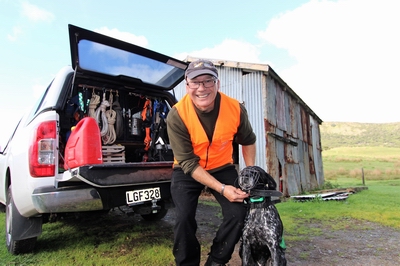Specially trained dogs join Hokianga wallaby hunt
11 May 2018
Two central North Island contractors and their specially trained biosecurity dogs have joined a multi-agency hunt for a wallaby reportedly seen in the South Hokianga.
Kane McElrea, the Northland Regional Council’s Biosecurity Manager – Partnerships & Strategy, says a witness’s description of the distinctive kangaroo-like creature – which they had seen close-up more than once – and its feeding and other behaviour indicated the mystery animal could indeed be a wallaby.
As a result, up to a dozen staff and contractors from the council, Department of Conservation and Te Roroa iwi are working on an initial response over roughly 500 hectares of privately owned farmland and native bush.
Mr McElrea says wallabies are unwanted because they eat native and exotic seedlings and pasture; making them potentially costly to the farming and forestry sectors and posing a risk to native bush too, as they can limit the regeneration of some species.
“In my opinion, they’re even more of a threat to Northland than possums, which is why they’re are formally classified as an ‘exclusion pest’ under the council’s Regional Pest Management Plan due to the serious environmental, economic and other risks they pose.”
Initial surveillance using high tech thermal imaging equipment, baited motion detection cameras and DNA testing of scat and fur had not yet confirmed the presence of any wallaby.
Experienced response contractors with two specially-trained wallaby tracking dogs had arrived in Northland in the past few days to undertake additional surveillance.
Mr McElrea says with several species of wallaby long present in other parts of New Zealand, the potential Northland sightings were being taken seriously.
“If indeed a wallaby or wallabies are here, the most likely scenario is a deliberate, and illegal liberation from either the central North Island or Kawau Island.” (Wallaby were famously introduced to New Zealand almost 150 years ago when Sir George Grey released them on Kawau.)
Council chairman Bill Shepherd says he’s pleased the Northland wallaby sighting is being taken seriously.
“This is a potentially a very serious incursion and a proactive multi-agency response now significantly reduces the risk of another pest potentially becoming established in Northland.”
Mr McElrea says it’s understood the witness saw a wallaby on at least two separate occasions at their Waimamaku property in recent months, but did not initially appreciate the potential significance of the incidents.
“Council only became aware of the situation recently (in mid-April) after news of the sightings reached another Hokianga local, who realised the seriousness of a potential incursion and in turn alerted the Department of Conservation.”
 Bay of Plenty-based contractor Guus Knopers and his canine workmate, eight-year-old German short-haired pointer ‘Lotte’, prepare to search a Waimamaku property after unconfirmed wallaby sightings there.
Bay of Plenty-based contractor Guus Knopers and his canine workmate, eight-year-old German short-haired pointer ‘Lotte’, prepare to search a Waimamaku property after unconfirmed wallaby sightings there.
Mr McElrea says locals in the search area have been supportive of the multi-agency efforts and says the case serves as a reminder of the need to report any suspicious animal, fish or plant as soon as practicable to the regional council’s biosecurity team on 0800 002 004.
One of the specialists brought into Northland for the response is Te Puke man Guus Knopers who runs Bay of Plenty-based company ‘K9 Detection’.
Accompanying Mr Knopers is Lotte, his eight-year-old German short-haired pointer, who has been specifically trained to track wallabies.
Mr Knopers says it took about 12 months’ training for Lotte to gain the special Department of Conservation certification she holds and the duo do a lot of wallaby tracking in the Waikato and Bay of Plenty.
Mr McElrea says the regional council is footing the roughly $10,000 bill for the initial response to the potential wallaby incursion. However, if the pest’s presence was confirmed in Northland, a more extensive campaign to eradicate them would be needed.
General information about a wide variety of land and water-based pests – including wallabies – is available online via www.nrc.govt.nz/pestcontrolhub
